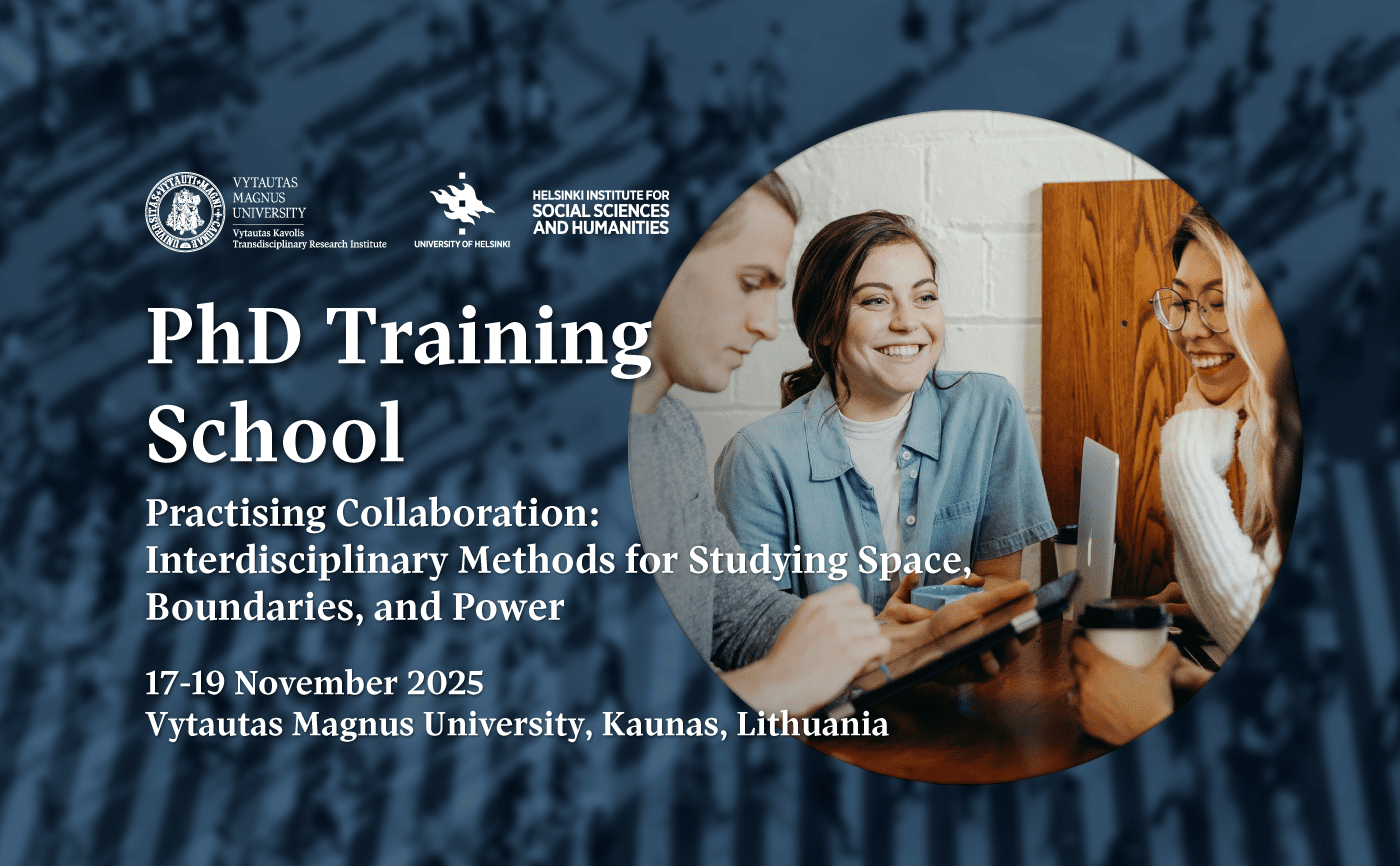Vytautas Magnus University Vytautas Kavolis Transdisciplinary Research Institute
Helsinki Institute for Social Sciences and Humanities
Practising Collaboration: Interdisciplinary Methods for Studying Space, Boundaries, and Power
PhD training school
17 – 19 November 2025
Kaunas, Lithuania
About
This training school explores how territory, space, and boundaries can be studied through collaborative and interdisciplinary methodologies.
Constructed borders and territories. We approach spaces and boundaries socially as politically constructed phenomena, seeing spaces not merely as physical containers but crucially as relational and symbolically produced phenomena defined by cultural meanings, historical processes, and power relations. Territories are constructed and reproduced through legal, political, and affective practices which intersect with claims and negotiations of identity, governance, and belonging. A more nuanced understanding of how boundaries between nations, inside human communities, between humans and machines, or between societies and the environment is essential as we face rapid changes of security and social order.
Collaborative research. Understanding the complex shifts and dynamics of the changing material and symbolic boundaries calls for more intense and interdisciplinary cooperation between scholars from different fields. Social scientists and humanist researchers are raising to this challenge with projects that demand increasingly co-productive research projects, shared data resources and continous methodological development. Future scholars need to grasp collaboration both as an epistemic stance and a practical research strategy, including co-creation with communities, multi-sited fieldwork, participatory mapping, and digital ethnography. In particular, with the raise of computational methods and AI-enhanced research tools, collaborations between quantitative and qualitative paradigms are pertinent. Carefully planned and innovative crossing of boundaries between disciplines, approaches can empower scholars also to reach more societal impact.
Invitation to participate. This three-day training course provides early-stage researchers (PhD students and early-career postdocs) with conceptual, empirical, and methodological tools to rethink how territorial dynamics operate within and across different kinds of borders.
The programme offers:
- a rich set of research-based perspectives on contemporary questions on how space, territory and boundaries are experienced, claimed or contested;
- an intensive, hands-on workshop experience of working with an opportunity to engage with peers and senior scholars, and a chance to build collaborative international and interdisciplinary research networks for the future contemporary resilience-needed societies;
- workshop streams will focus on a selection of data, case studies and ideas drawn from the projects and ideas submitted by participants (see: how to apply).
In addition to hearing keynote lectures from senior staff, all participants will participate in one of three workshop tracks of the training school. The workshop tracks will include pre-demonstrations of collaborative, interdisciplinary projects, drawing from the data, methods, and theoretical approaches of the participants. Preparation for the workshop streams will require some work before the intensive week, when possible, sharing of data, ongoing work, and plans.
Themes that can connect your own research to the training school work can cover a wide range, for instance:
- Spatial justice and urban resilience;
- Art and heritage interventions in territorial disputes;
- Surveillance spaces: architecture, technology, and governance;
- Digital territories: data sovereignty and cyber-borders;
- AI vs. human intelligence; virtual world vs. physical world; differences between synthetic intelligence and human intelligence;
- Borders as emotional landscapes;
- Boundaries, spaces and power in geopolitics;
- Boundaries/borders, spaces and power in global immigration: humanitarianism vs. security.
Learning methods:
- Theoretical lectures;
- Co-designing a collaborative research demonstrations;
- Creating a conceptual map of “space”, “boundary”, and “security” using participants’ disciplinary frameworks;
- Writing a short reflexive piece on collaborative dilemmas in one’s fieldwork;
- Designing an individual “collaborative fieldwork plan.”
Information about ECTS
Participants of the Training school who wish to receive a certificate of attendance worth 3 ECTS need to submit 3-5 pages written critical reflection of their research project discussing the school topic one month after the school ends. Guidelines and templates for the home assignment will be provided on-site.
Organisers: V. Kavolis Transdisciplinary Research Institute (Vytautas Magnus University, Lithuania) and Helsinki Institute for Social Sciences and Humanities, HSSH (University of Helsinki, Finland).
Date: 17 – 19 November 2025.
Venue: Vytautas Magnus University, Kaunas, Lithuania.
Who can attend?
- Master students, PhD candidates and postdoctoral researchers.
Teachers:
- Assoc. Prof. Dr. Jurga Bučaitė-Vilkė (Vytautas Magnus University);
- Prof. Dr. Vytis Čiubrinskas (Vytautas Magnus University);
- Assoc. Prof. Dr. Ingrida Gečienė-Janulionė (Vilnius University);
- Dr. Indrė Gražulevičiūtė-Vileniškė (Kaunas University of Technology);
- Dr. Şevket Benhür Oral (Vytautas Magnus University);
- Prof. Dr. Hannu Nieminen (Vytautas Magnus University).
More information about teachers is here.
Team moderator:
- Dr. Anton Berg, Helsinki University, Institute of Social Sciences and Humanities.
How to apply?
To apply, please provide:
- One-page letter with an expression of interest, motivation, and a paragraph describing the relevant academic pre-experiences and activities with the topic of the Training School;
- A Curriculum Vitae (CV).
- A brief (300–400-word) concept note (abstract):
- Frame the research problem in relation to the school’s theme;
- State research questions, theoretical framework, and planned data/methods.
All applications should be submitted via email to vki@vdu.lt no later than 3 October 2025. All applicants will be contacted directly by email by 10 October 2025.
Evaluation criteria
Applicants will be evaluated based on the following criteria:
- Early Career Researchers working on related topics;
- Relevance of applicants’ academic background and research experience to the School’s focus;
- Diversity of participants, ensuring a balanced mix of educational and geographical backgrounds;
- Clarity and quality of the proposed research project description.
Fees
The training school cannot provide scholarships, but does not charge participation fees. Coffee breaks and lunch will be provided.
Contacts
If you have any questions, please send your inquiry to vki@vdu.lt
Scientific Committee:
- Assoc. Prof. Dr. Jurga Bučaitė-Vilkė (V. Kavolis Institute);
- Prof. Dr. Risto Kunelius (HSSH);
- Dr. Pekka Mäkelä (HSSH).
Organizing Committee:
- Assoc. Prof. Dr. Jurga Bučaitė-Vilkė (V. Kavolis Institute);
- Dr. Gintarė Pocė (V. Kavolis Institute);
- Daiva Vilčinskienė (V. Kavolis Institute);
- Prof. Dr. Risto Kunelius (HSSH);
- Dr. Pekka Mäkelä (HSSH);
- Anna Jarske-Fransas (HSSH).
This workshop is one of the activities of the project “Strengthening of R&D activities of the Vytautas Kavolis Transdisciplinary Institute of Social and Humanities Sciences (SOCMTEP)”. The project is financed by the Lithuanian Science Council and the Ministry of Education, Science and Sports of the Republic of Lithuania, contract no. S-A-UEI-23-13 (12/27/2023). Funding program – “University Excellence Initiative” (No. V-940).


